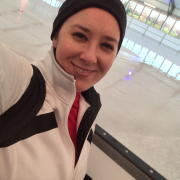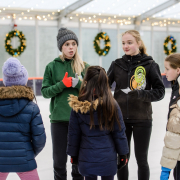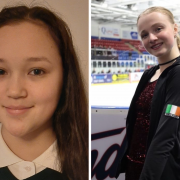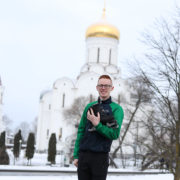Women In Sport Week: Coaching And Officiating (Part 2)
To mark Women In Sport Week (6-12 March), the Ice Skating Association of Ireland asked the women who make ice skating happen in Ireland a series of questions to hear about the challenges and unique culture of the sport within the country.
The theme for today is Coaching and Officiating. In the second of two parts, we hear from Margery Hilko who was the first judge from Ireland to officiate at an international competition.
What inspired you to get involved in ice skating, and how has the sport influenced your life?
Hilko: Ice skating has been very important to me. I skated when I was younger, as well as dance and a number of other sports, but figure skating was always my biggest love. I remember growing up watching my idols like Paul Wylie and Yuka Sato in the Olympics and jumping around the house to my mother’s horror. When I moved to Ireland and was afforded the chance to become involved with ice skating, I jumped at it. Judging has been a wonderful way to still be involved in the sport I love.
Becoming a judge has really helped me grow both personally and professionally. Many of the skills I’ve developed judging, like spotting details and making quick decisions, have great applicability to my everyday work. It has given me a lot of confidence and the belief and skills that I can overcome obstacles.
While I don’t get on the ice as much as I’d like to anymore, it has provided me so many opportunities to grow and learn.
Women in sport have historically faced barriers to participation and recognition. Have you experienced any challenges or obstacles in ice skating in Ireland because of your gender?
Hilko: Skating in Ireland is lucky to have a core of strong women who have been dedicated to helping skating, and other women, succeed in Ireland. I have benefited from this, and am very grateful for all the support and opportunities I’ve been given.
The ISAI has always been very accepting of women, so I don’t feel that in Ireland my gender has been a challenge within the sport. However, the opportunities afforded to skating in Ireland have probably been hampered by the perception that it is a ‘women’s sport’ despite Ireland having successful male skaters as well. This has hurt the sports development in Ireland, in my opinion. I think this has meant that the sport has been given lower priority in terms of funding from outside sources.
What do you feel are the positive aspects of being a woman involved in ice skating in Ireland?
Hilko: Being a woman in ice skating in Ireland has been incredibly rewarding. Our smaller community has meant that we are very supportive to each other in our development, both on and off the ice.
Representation and visibility are important issues in all areas of life, including sport. What would you like to see happen in the world of ice skating to encourage more women to participate and succeed ?
Hilko: The easy answer is always to say better access to ice time. The past few years have seen a lot of rinks go under or close.
However, the skating world has also seen a lot of officials leaving during this time period as well. I would love to see more Irish take up the other side of skating and become an official. Irish skaters have the opportunity to skate across the globe, and we don’t currently have judges to send to every competition.
Officials are a vital part of ensuring that our skaters can properly develop. If we had more who were interested, we could assist skaters better, as well as increasing Irish visibility outside of the country. There are lots of opportunities to participate and find personal success as an official too.



